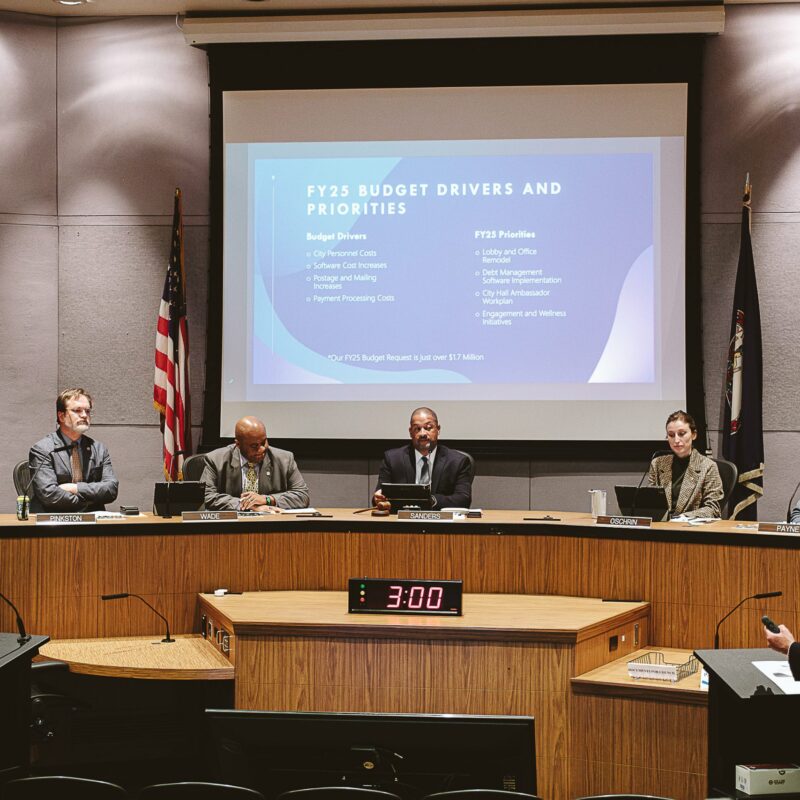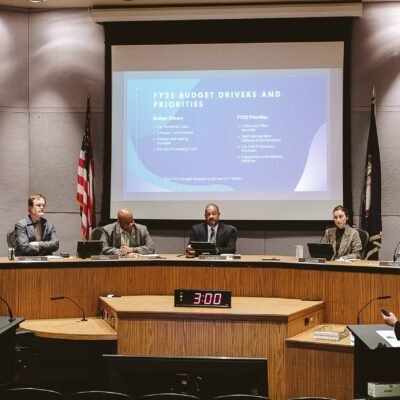Martha Trujillo adjusts her red vest, clips on the “Hablo Español” button and checks her pager. At 6:15pm on a Wednesday night, the atmosphere is calm. A few patients in wheelchairs roll through the lobby of the UVA hospital; visitors browse the hospital gift shop for some special memento and physicians hurry by. She checks her pager again. No calls. Yet.
|
Martha Trujillo volunteers at the UVA Hospital one night a week, where she helps Spanish-speaking patients with a quick translation of the doctor’s orders and with making a foreign environment seem more familiar. “I just listen to them and I just try to encourage them to ask if they need any help,” says Trujillo. |
Every Wednesday night for four hours or so, Trujillo wanders the floors of the hospital and meets with Spanish-speaking patients that need assistance communicating with nurses and doctors and who, more generally, need a friendly voice to reassure them that not everything around them is foreign. “Buenas noches, soy Martha Trujillo. ¿Cómo está usted?”
Her hospital time is strictly on a volunteer basis, though closely related to her day job. Trujillo’s days and evenings are busy as she bridges the gap between the area’s increasing Latino population and numerous service providers. She answers phone calls, translates important legal documents, promotes health care training programs for Latino mothers, and more. But with a growing Latino population and an inadequate number of Spanish-speaking personnel, not to mention shrinking financial resources, it seems that Trujillo is effectively liaising with the Latino community on her own.
All about access
I met Trujillo in her office the day after one of her volunteer hospital shifts (I couldn’t accompany her because UVA prohibits media from shadowing volunteers due to patients’ privacy concerns). It was a good night, she told me: “I saw 13 patients.” Some were parents of newborns, an aspect of her volunteering she loves most. Trujillo happily recounted helping a new mother understand the nurse’s instructions on feeding her baby. In a foreign language, even the basics can seem incomprehensible.
“I saw another mother—her baby is going to have surgery next week and she wanted the baby to be baptized,” she said. Trujillo helped the out-of-towners locate a place to buy an appropriate dress for the baby’s baptism and, in the conversation, slipped in that if they needed any additional help, she would be the right person to ask.
“Besides the translation, sometimes, because of my job, I can answer some questions and little things,” Trujillo says. But most importantly, “I am there to respect them, to help them. … I don’t ask them about the specific things about surgery. … If they want to talk to me and tell me, I just listen.” Trujillo’s day job is Outreach Coordinator for United Way. As a volunteer, she also chairs Creciendo Juntos (CJ), a network of agencies that cater to Latinos in Charlottesville and Albemarle. Effectively, in many capacities and wearing many official titles, Trujillo is the point of reference for families that need help filing taxes, calling a cab, turning on their fuel-operated heater in their homes, placing their kids in the correct grade at school, finding a job and doing everything in between.
Resources for liaison services like Trujillo provides are shrinking and the need for local support is much greater. Peter Loach, treasurer of Creciendo Juntos and an administrator for the Piedmont Housing Alliance, wrote to the Albemarle County Board of Supervisors last year that their $12,800 support was leveraged with $105,000 worth in training hours and outreach work.
With an uncertain financial outlook for the next couple of years, initiatives like Creciendo Juntos, which helps agencies learn about the culture, needs and desires of the increasing Latino population, are struggling. Indeed, Albemarle County, where close to 6 percent of the population is Latino, axed its very modest contribution to Creciendo Juntos in 2010, and supervisors are unable to say if they’ll restore the funding, despite the fact that the Latino population continues to rise in Albemarle, as it does in the city.
A story to tell
On May 3, 1999, Martha Trujillo landed in Charlottesville. A native of Mexico City, Trujillo and her husband, Ruben, left Mexico and chose to settle in the shadows of the Blue Ridge Mountains.
“We left everything. We couldn’t take anything—just our suitcase—and we came here and there was nothing,” she says, her dark eyes welling with sadness. Her husband arrived here ahead of Trujillo and their two children, Andrea and Diego.
The shock of the departure still echoes in her voice. She tells of their life in Mexico City, of trips to Acapulco, a new house, a car-free commute, a close-knit family, grandma babysitting. Still, Trujillo quickly picks herself up and plumbs the memories of her arrival. “The first night, I remember, he went to the airport and my son, after six months, he didn’t know he was his father,” she says. At that time, Diego was 23 months old. Her daughter was 10 years old. The townhouse her husband rented for them was clean, “perfect,” yet empty.
“I remember the first thing I wanted to buy was an iron, because I wanted to be able to iron clothes to look nice, but then I learned that here people don’t like to iron,” she says, laughing.
The move, undoubtedly, has changed many aspects of her life. What she did not expect, however, was a name change, too. Born Martha Amaya-Rivera, she changed her name in an immigration office where she was waiting to get her work permit. The legal application was made to the entire Trujillo family, “and then I became Martha Trujillo.”
She brushed that incident off and didn’t lose time. She got a sales job at the local T.J.Maxx, where she still works on certain evenings. It was at T.J. Maxx that she began to master the language, learning new vocabulary daily. She was offered and turned down an assistant manager position. “I wanted to work with Latino families,” she says. “I knew my Spanish would be helpful and I started looking for a job.”
In 2005, she was hired at United Way and soon got involved as an organizer with CJ, too. Now she chairs the all-volunteer organization. A youthful 43-year-old, Trujillo shoulders significant responsibilities. “She is the first point of contact for a lot of people,” says Cathy Smith Train, president United Way-Thomas Jefferson Area. “It’s not just about being a resource for people coming in the door … She has a very significant interest in making sure that they access the resources they need, but that they are aligning everything they are doing in the appropriate legal manner,” says Train.
Her position with United Way enables Trujillo to assist families one-on-one and in direct response to their needs. In a recent week, Trujillo received several calls from folks who needed help with their fuel-assistance program.
“They call me to see if I can call to see how much or when they are coming to the house,” to activate the gas. At times she is on a three-line conversation, such as when a company requires confidential information. Trujillo is experienced with the bumps and hurdles of life in the United States; she knows she provides a living example for new immigrants.
“Because I went through that situation, so I know exactly the resources that are available,” she says. “If not, I can look for that.” As an example, Trujillo’s daughter Andrea became ill and required hospitalization a short time after they moved to Charlottesville. She had to learn how to converse with the doctors and nurses. “I wanted to understand and feel confident of what the doctors were telling me about my daughter,” she says. “If my daughter will never get sick, I would never get it.” Another example: At the end of each fiscal year, Trujillo and her husband didn’t file their taxes. “In Mexico I didn’t have to worry about it,” she says, because her employer would take care of it. “I never thought about it. When I found out, and I went to pay taxes, I found out I owed a lot of money,” says Trujillo. More than $12,000. As a result of that experience, she became a certified agent with the IRS enabling her to help other people to correctly fill in every line on their tax forms. “I know how to do it and I learned how to file taxes and I now help people,” she says. “Not just filing taxes, I help them to understand why they have to pay and to be debt-free. That’s my goal.”
Loach knows Trujillo’s work in that setting. Creciendo Juntos was created in 2005 by the Piedmont Housing Alliance (PHA) and is a network of service providers that cater to area Latinos. “Martha is at the eye of the storm,” he says of her work helping hundreds and hundreds of families to ease into life in a new country. But the obvious question is why, with a growing Hispanic population, Trujillo is essentially going it alone.
Shrinking support
Facing an $11 million decline in revenue between the 2008-2009 budget and the adopted budget for Fiscal Year 2010-2011, Albemarle County supervisors cut funding for Creciendo Juntos. The $292.2 million budget did not include the $12,800 that had previously helped support CJ’s operating costs. The miniscule portion of the county’s budget meant a great deal more to CJ, which is part of the Piedmont Housing Alliance’s Latino Initiative. The city of Charlottesville maintained its $12,800 commitment; other monies come from direct fundraising and there are in-kind donations from churches, too.
“There were significant cuts all over the county and one of the mirrors that we look through was whether the function was mandated or contractual, whether it dealt with public safety or public health and anything other than that was subject to reductions or cuts,” says Ron White, director of the Albemarle County Department of Housing, which oversees PHA’s funding. “Last year, the budget was at a place that we really had to focus on funding core activities.” Those include the local SPCA, regional libraries and the jail.
Ann Mallek, chair of the Board of Supervisors, says that supervisors “rely heavily” upon the review team when making budget decisions. According to Mallek, the team spends hundreds of hours preparing and evaluating each organization’s funding proposal. “They try very hard to make judgments based upon the right facts, rather than each of us taking our favorites, which would be completely unfair,” she says. Although reductions and cuts were made “across the board,” Mallek acknowledges the work CJ is doing for the community.
“I know that it’s a group that has been very active and helpful in the community,” she says.
|
Cathy Smith Train, president of the local United Way, has noticed, over time, a significant increase in the number of Latino families who reach out to Trujillo for help. “Over the period of time that Martha has been here, it became very evident to, particularly the city and the county, that she could be a good resource for their residents, particularly the Latino community, who don’t always turn to government sources for support,” she says. |
Fellow supervisor Ken Boyd agrees. “I know there were a number of [agencies] that weren’t approved that were approved in previous years,” he says. “We don’t interject ourselves as supervisors.” Loach is “not very optimistic” that the county will restore CJ funding. But Mallek says, “This year there is a little more confidence based upon the fact that we are moving, progressing on a level field as new businesses and new hiring happened and things start to improve.”
She adds, “The one big elephant is what the state is going to do.”
“This year we have a very unpredictable governor and legislature. They are chopping things such as support for our airports and they are saying, ‘We are going to make economic development a really big push,’ but they are completely wiping out all these other funds that contribute to economic development,” she says.
Regardless of how budgets shape up in the next few months, the question of access for Latino residents remains. While Charlottesville is home to a multitude of service providers for local residents, for newcomers with cultural and language barriers these agencies are hard to navigate and hard to find.
Access not granted
Loach calls the funding cut disappointing. “It’s a little disappointing in that Albemarle County has the most Latinos in the area and we are not talking about hundred of thousands of dollars. A little goes a long way,” he says. “It also demonstrates [the county’s] commitment to embracing newcomers and integrating the community as much as possible.”
Even with little funding, CJ’s impact has been significant, says Loach. CJ was developed to address challenges that impede the quest to serve area Latinos. Then, PHA had three main goals in mind: help service providers and nonprofits “improve their service delivery to the Latino community,” says Loach, who is also a member of the state Virginia Latino Advisory Board. In addition, CJ proposed to reach out to area Latinos to educate them about the services that are available in Charlottesville and Albemarle, how they work and how to access them. “The third goal is really to inspire the community at large to embrace diversity and celebrate diversity,” says Loach.
Since its inception, CJ has trained more than 1,500 people working in service agencies through more than 50 workshops, events and fairs. Its outreach program has touched and involved more than 3,300 Latinos and one of CJ’s programs, Lay Health Promoter, has trained numerous Latinos to assist others with health care needs. Although Trujillo is active in all the aspects of immigrant family life, she says she still has ground to gain. “I will keep learning. I think it’s just the key to succeed as a person,” she says. “I am here to help anyone and CJ is giving me the opportunity to get more access to services. I will continue.”
Although resources are shrinking, the number of Latinos in the area has been increasing. According to the recently released 2010 Census data, Albemarle County recorded 5,417 Latinos, or 5.4 percent of the total population of 98,970. That’s an increase from 2009 census numbers, which counted Latinos as 3.9 percent, or 3,707, of the total county population.
Much of the same happened in Charlottesville. In 2010, Latinos counted for 5.1 percent, or 2,223, of the total population, 43,475. In 2009, the city recorded 1,629 Latinos, or 3.86 percent of the population.
Statewide, the Hispanic population tripled between 1990 and 2006, from 152,000 to 460,000, according to a 2008 study by the Weldon Cooper Center at UVA. Interestingly, 60 percent of Hispanics in Virginia are U.S. citizens, with 47 percent being U.S.-born and 13 percent naturalized citizens. The remaining 40 percent are immigrants. In “Virginia’s Workforce Trends,” the Center reports that Hispanics have the highest labor participation rate in the Commonwealth with 79.1 percent, closely followed by Asians with 72.6 percent. Blacks’ labor participation rate is 68.4 percent and for whites it’s 67.8 percent.
Insatiable service
Given the increasing numbers, is the local Latino population well served? Loach is torn.
“The Latino population, like everyone else, works hard, goes to school, does all the things that residents in the area do. They are not here getting some special handout,” he says.
Although matters have somewhat improved, many service providers still lack adequate Spanish-speaking personnel. A couple of years back, a University of Virginia class did an experiment. Students cold-called local agencies in Spanish to receive information about services and how to access them. “The results were not uplifting in that less than half of the agencies could really handle the phone call,” says Loach. “There isn’t a lot of money out there to hire people to just be interpreters.” The good news, however, is that there are a lot more agencies that are playing catch-up and hiring bilingual staff. That’s where Trujillo comes in.
Her insatiable desire to give back has not gone unnoticed. “Martha is a leader, a person of great leadership qualities,” says Loach. “She is not just a leader who is helping Latinos, she is a leader who is helping the whole community. She is an inspiring example of how a newcomer to Virginia can bring their talent and knowledge and strengthen the entire community. We are a much stronger community because of her being here.” Marnie Allen, director for MACAA’s Hope House, who works with Trujillo to translate applications for temporary housing, agrees. “She is phenomenal. She has been through her own challenges and she has been able to really use that as inspiration and to help other people,” she says. “She is not only helping with Creciendo Juntos, but she does outreach to other venues and exposes people to what the issues are in the Latino community and tries to bridge that gap, which I think is the only way we are going to make progress.”
For Train, the increase of Latino families reaching out for services has been significant, increasing over time. “I think that’s because you start out and there is the need to build credibility with that community and [Trujillo] has done that,” she says. Community support is “robust,” says Train, but there remains some skepticism, especially when it comes to divulging personal information.
That’s one reason Trujillo urges basic English competency when she’s working with Spanish speakers new to the community. “I really encourage people to learn some English, do not be dependent on someone who speaks both languages,” she says.
“You don’t need to know the specifics, you don’t need to be literate in every single aspect of life, but on your needs. You need to focus on that.”
Nowadays, Trujillo serves on the UVA Cancer Center Community Advisory Board on health disparities and teaches Spanish to medical students at Speak! in Downtown Charlottesville. She wants to get certified in CPR and wants to give Latino women health care training. “I want to train them as health promoters, so they know about health issues, but the main thing is for them to show a path to continue their education, to be self-sufficient and to learn that women have the power to be happy,” she says.
All that, by the way, is in addition to her 9-to-5 job at United Way.
“I have no idea how she accomplishes all that she does,” says Nila Saliba of the UVA Cancer Center. “She is involved in several projects, just one of which would be daunting for someone with normal energy. She never slows down.
“She is invaluable to this community. We are just very lucky to have her.”
A few days after I talked to Trujillo at the hospital, she’s seated in a second-floor office at United Way’s High Street headquarters. She’s attentively listening to a conference call. She has been involved in United Way’s Earned Income Tax Credit program, a refundable tax credit program for working families. She jots down notes and questions. In less than five minutes a family is coming in with their tax documents. Trujillo wants to be ready. She hangs up the phone, takes a deep breath and walks downstairs.
“Buenos Días,” she says. “¿Cómo están ustedes?”
/RI_-IMG_7667.jpg)
/110216_0005.jpg)





